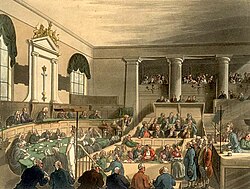Trial
A trial is where 2 people or 2 groups of people argue in a court.
Civil trial
In a civil trial, there is a plaintiff and a defendant. The plaintiff tries to prove that he or she has a reason why the defendant needs to give him or her money.
Criminal trial
In a criminal trial, there is a prosecutor and a defendant. The prosecutor works for the government and tries to prove that the defendant committed a crime. It often takes a long time to get a trial scheduled as the courts can be very busy. In the United States, Federal court can take up to 10 months to get a court date.
Judge
The judge controls the courtroom. He or she decides who speaks when, and they decide what evidence and arguments can be used. Sometimes, a jury is brought in to determine whether the defendant is guilty or not guilty. If there is no jury, the judge or judges decide whether the defendant is proven guilty or not. If the defendant is proven guilty of the crime, the judge will decide the punishment, which is also called the "sentence". If the crime is serious, the defendant may go to prison or, in some countries, be executed. For smaller crimes, there is often a fine—money that must be paid, in addition to having a criminal record.
Differences in each country
Trials are different in places where the laws are different. Different countries, cities and states all have different laws that change how trials happen. Trials in some places are very short. In some places, however, important trials can take as long as a few years while the two sides gather information and put together their arguments.
Trial Media
Trial of Jean II, Duke of Alençon, October 1458
The Old Bailey in London, 1808

